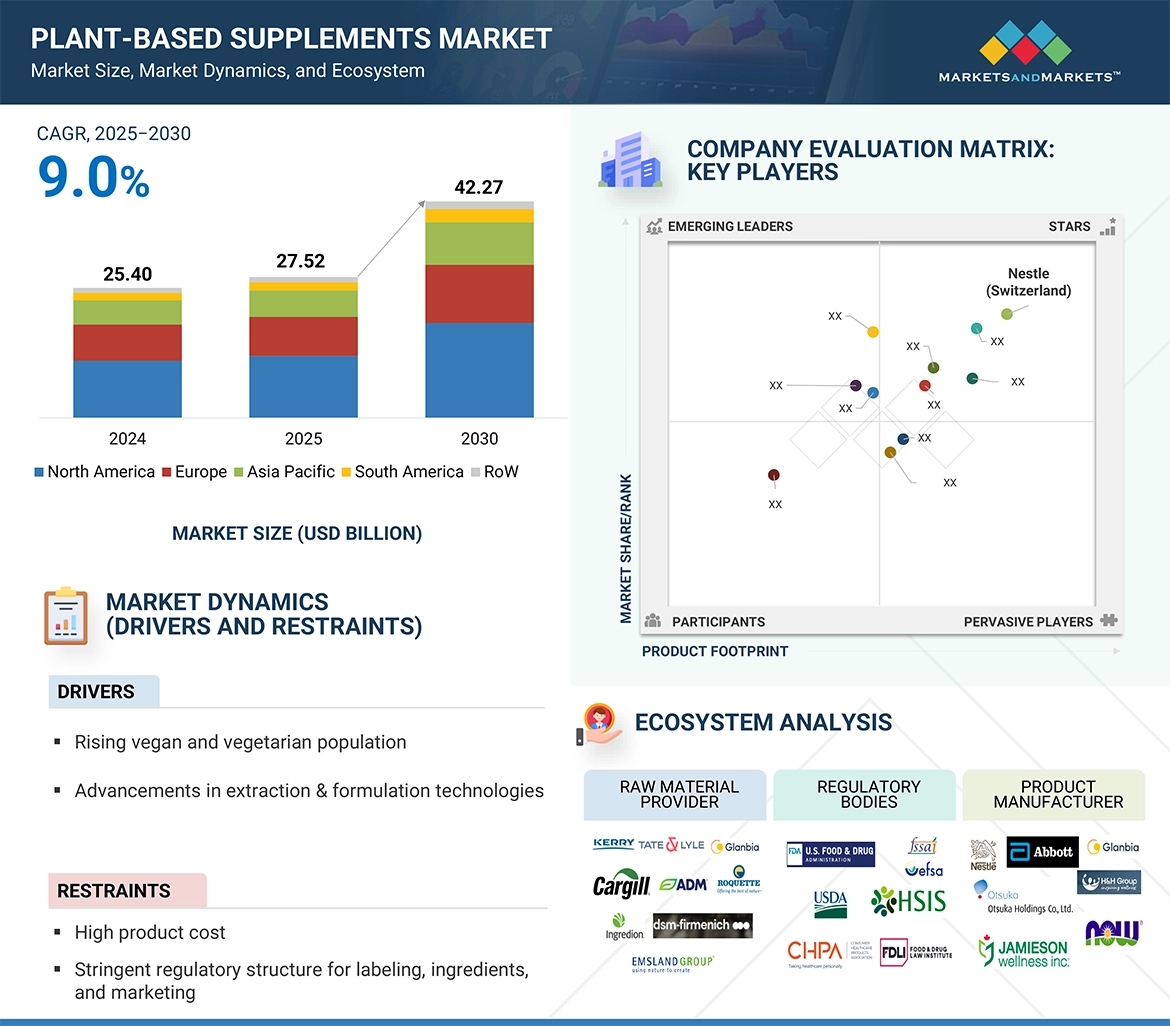The plant-based supplements market is estimated at USD 27.52 billion in 2025 and is projected to reach USD 42.27 billion by 2030, at a CAGR of 9.0% from 2025 to 2030. The global market has become a major force in the health and wellness world. Driven by rising consumer demand for holistic and sustainable nutrition, this dynamic sector is experiencing rapid growth and product innovation. Here’s a comprehensive look at what’s powering the market, key trends, challenges, and what to expect in the coming years.

What Are Plant-Based Supplements?
Plant-based supplements are nutritional products derived solely from natural plant sources such as fruits, vegetables, herbs, roots, and seeds. They exclude synthetic additives and animal-derived ingredients, offering consumers options like plant protein powders, herbal extracts, vegan multivitamins, adaptogenic botanicals, and superfood blends for wellness support
Plant-Based Supplements Market Growth Drivers
Consumer Shift to Wellness: More people are making holistic wellness a priority, searching for natural, ethically produced products to enhance immunity, energy, digestion, and mental health.
Sustainability and Clean Labels: The appeal of plant-based supplements lies in their clean label, absence of synthetic additives, and eco-friendly sourcing, which are particularly strong among Millennials and Gen Z.
Increased Vegan and Flexitarian Populations: Greater adoption of vegan and vegetarian diets for health, ethical, and environmental reasons continues to push demand.
Prevalence of Chronic Diseases: Conditions like diabetes, obesity, and cardiovascular disease have led to increased interest in preventive healthcare solutions, driving supplement use.
Product and Ingredient Innovation: Brands are introducing a wide variety of new supplements, from vegan omega-3 blends (often sourced from algae) to adaptogenic herbs and plant-based multivitamins.
Technological Advancements: Innovations in extraction and formulation, like cold-pressing and CO₂ extraction, have improved the purity, potency, and bioavailability of plant-derived nutrients.
Plant-Based Supplements Market Trends
Personalized Nutrition: Today’s consumers expect tailored health solutions. This has caused an explosion of product forms (powders, capsules, gummies, and drinks) designed for specific health needs like weight loss, hormone balance, and stress support.
Transparency and Science-Backed Claims: Shoppers favor brands that provide clear information, proven health benefits, and certifications, boosting trust and loyalty.
Digital and Direct-to-Consumer Growth: E-commerce platforms, influencer marketing, and subscription services make plant-based supplements more accessible and encourage brand loyalty.
Regional Insights
Asia Pacific: Expected to be a major driver of future growth due to rising health awareness, increasing disposable income, and traditional acceptance of herbal remedies in countries like China, India, Japan, and South Korea.
North America and Europe: These markets are mature with heightened consumer awareness and large vegan populations but continue to grow through product innovation and expanding retail availability.
Top 10 Companies in the Plant-based Supplements Market
- Nestlé (Switzerland)
- Abbott (US)
- Glanbia PLC (Germany)
- Otsuka Holdings Co., Ltd. (Japan)
- Herbalife Ltd. (US)
- H&H Group (Hong Kong)
- Jamieson Wellness Inc. (Canada)
- Rootine (US)
- Ritual (US)
- NOW Foods (US)
Future Outlook
As plant-based living moves mainstream, expect continued growth, more innovation, and broader adoption of supplements for diverse health needs. The convergence of digital convenience, personalized wellness, eco-consciousness, and functional nutrition positions the plant-based supplements market as a dynamic space for both consumers and brands.
